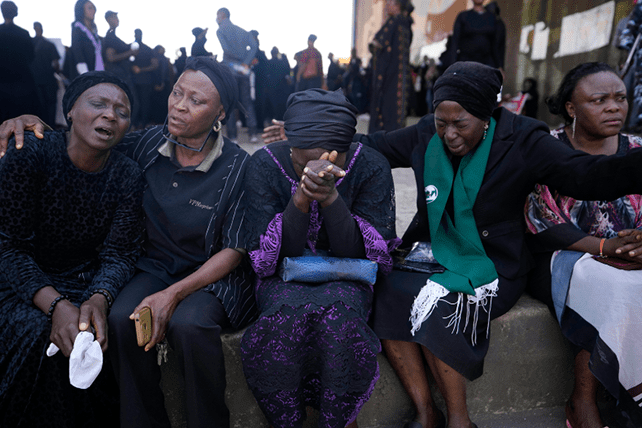LAGOS, Nigeria (RNS) — Ruth Abah, 28, no longer walks to her local church, St. Paul’s, which now lies in ashes. Instead, the mother of two locks her doors and prays with her children, fearful the next attack could come at any moment.
On Aug. 11, suspected Fulani herdsmen stormed the compound of the Catholic church in the village of Aye-Twar, in central Nigeria, setting the church, rectory and parish offices ablaze along with vehicles and other property. Earlier raids had already forced the parish’s 26 outstations to shut down.
The latest assaults have sent the remaining residents fleeing into the bush, leaving the parish grounds and surrounding community eerily deserted.
The destruction of St. Paul’s is a stark sign of how attacks by Fulani “jihadists,” who champion Islam but are disavowed by many Muslims, is hollowing out once-thriving Christian communities across the region. Known as Nigeria’s “food basket,” Benue state has become a center of the violence that has left thousands dead this year.
“I used to be in church every Sunday, singing in the choir,” Abah said in a phone interview. “Now I keep the doors locked. If I hear voices shouting at night, I pray silently. If they see me walking to church with a Bible, they could kill me.”
A new report by the International Society for Civil Liberties and Rule of Law, known as Intersociety, paints a grim picture. In the first seven months of 2025 alone, Islamist groups killed 7,087 Christians and abducted 7,800 others because of their faith. The country now sees an average of 30 Christians killed every day, making Nigeria the most dangerous place in the world to be a Christian.
Emeka Umeagbalasi, lead researcher and chair of Intersociety, described the situation as a “brutal massacre” of “defenseless Christians” and warned that unchecked killings and abductions are wiping out entire communities.
Nigeria, Africa’s most populous nation with more than 236 million people, has been plagued by Islamist violence for more than a decade, particularly in its northern and central regions. The insurgency began with Boko Haram, an extremist Islamist group that launched an armed campaign in 2009 to establish a caliphate and enforce a strict interpretation of Shariah.
The group gained international notoriety in 2014 after abducting 276 schoolgirls from Chibok, sparking the global #BringBackOurGirls campaign. Though weakened by military offensives, Boko Haram splintered, and its more brutal faction, the Islamic State West Africa Province, continues to carry out mass killings, kidnappings and church burnings.
Christians, who make up about half of Nigeria’s population, have borne the brunt of the violence, especially in the region called the Middle Belt, where Muslim herders and largely Christian farming communities clash over land and resources. Armed Fulani militias — some linked to jihadist groups — increasingly target villages, pastors and churches, displacing communities and leaving farmlands abandoned.

